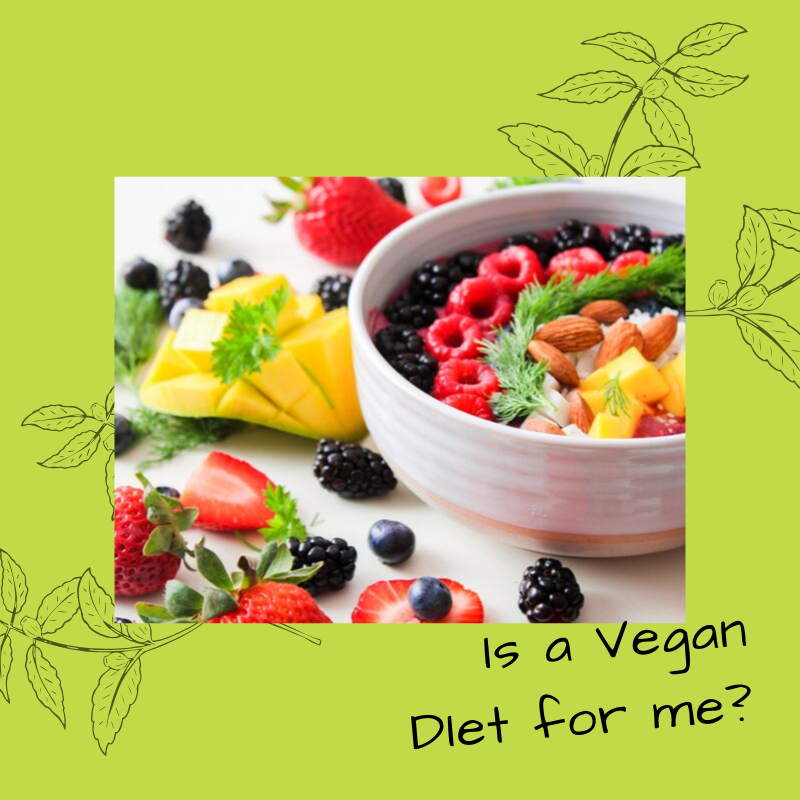What is a Vegan Diet?
A Vegan diet consists of eating only plants and food that is made from plants. Vegans do not eat food that comes from animals, including meat, fish, dairy, eggs and honey.
Why do people choose to go Vegan?
There are many reasons why people choose to follow a Vegan Diet. For some, it’s the belief that all animals have a right to live and that killing them for food is wrong. For others, it’s their affection for all animals and the fact that they struggle with the difference between taking their pet for a walk and then coming home to a roast beef dinner! Many Vegans think that certain animals, eg chickens and dairy cows, have very short unhappy lives and they find factory farming cruel.
Some people choose a Vegan Diet to help stop the destruction on the environment. Huge amounts of land are needed to keep and feed the animals, and this is a great contribution towards deforestation. The crops which are animals eat also need pesticides which pollutes the waterways.
Health benefits are another choice for going Vegan as it is believed that by eating only plant-based foods, your cholesterol level and blood pressure would be lower, and you would have a lower risk of developing heart disease and cancer.
Many celebrities are following a Vegan Diet which makes it quite trendy, therefore having a large following amongst the younger generation.
These days, it is easier to follow a Vegan Diet as there are many more Vegan cafes and restaurants or restaurants with Vegan options to choose from. Supermarkets are catering more and more for Vegans too with many foods having Vegan alternatives.
Is a Vegan Diet healthy?
A Vegan Diet can be very healthy if you choose the right foods, However, just because something is ‘Vegan’, it doesn’t mean that it’s healthy. Sugar, refined flour, chips and cookies can all be eaten on a Vegan Diet so, if that’s all you are eating, it would be a very unhealthy diet. Try to eat fresh, unprocessed foods and avoid refined carbohydrates.
Are there any health benefits?
There are many health benefits to following a Vegan Diet including a lesser risk of developing high blood pressure than people who eat meat. Vegans are also inclined to have lower BMI (body mass index) levels and lower LDL cholesterol levels. Supplements may be needed to make sure that you are getting all the nutrients that you need but with careful planning a Vegan Diet can be healthy.
Can I lose weight on a Vegan Diet?
Following a vegan diet can help with weight loss. One study showed women who followed a Vegan Diet for 6 months were eating less calories and fat and had faster weight loss in the short term. On average, people consume 500 calories a day less than people following a non-Vegan Diet. Remember that calories in cookies don’t equal the same calories in healthy non-processed food in terms of nutrition, so eating Vegan nut butter cookies all day (albeit within your calorie allowance) will not give you the correct nutrition.
You can achieve weight loss quickly if you are eating the correct foods. Don’t try to lose weight too quickly as you will lose muscle mass as well as fat and you could become deficient in certain nutrients. If you are finding that you are losing weight too quickly, try to increase portion sizes or add in a couple of extra snacks.
What can I eat if I choose to go Vegan?
You need to make sure that you are getting all your nutrients, so your diet should consist of whole grains, healthy fats, protein and fruit and veg. Avocado oil, coconut oil and olive all are all nutritious, healthy fats and nuts, seeds and soy products will help to boost your protein intake.
A healthy Vegan Diet should contain a balance of the following foods:
Vegetables (fresh or frozen)
Leafy vegetables (kale, spinach, spring greens, watercress, rocket)
Fruit (fresh or frozen)
Pasta
Beans (chickpeas, pinto beans, lentils, black beans)
Egg Substitutes (chia seeds, silken tofu, arrowroot powder, baking soda)
Grains (brown rice, oats, quinoa, buckwheat, barley)
Bread (make sure it doesn’t contain whey or eggs as some commercially produced bread does)
Nuts
Seeds
Spices
Snacks (popcorn, dark chocolate, nut butter, dried fruit, roasted chickpeas)
Soy products and protein powders (pea protein, hemp protein etc)
Dairy Substitutes (almond milk, oat milk, coconut milk, soy yogurts, Vegan cheese)
Oils & Fats (olive oil, avocado oil, coconut oil)
Sweeteners (stevia, coconut sugar, maple syrup, dates)
Try to limit or eliminate Vegan processed foods that contain:
Added fats
Added sugars
Added starches
Added salt
Added food additives
Make sure you will be getting enough vitamins and minerals when starting a Vegan Diet.
Click here for a sample meal plan!
